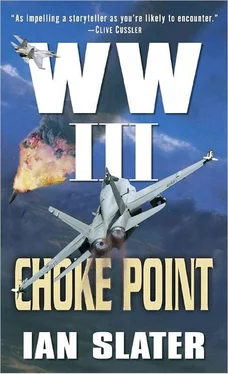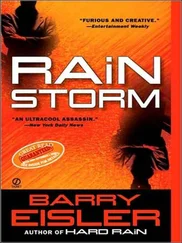“Close those drapes!”
Freeman was startled by the police bullhorn, but he walked over to the window and closed the curtains, stealing a glance at the dark strait. Not a single light was visible, where only shortly before it had been crowded with naval ships. The remainder of what had been the Turner ’s battle group were recalled and now steaming back down through Puget Sound to its home port in Everett, the group’s remaining attack sub slinking back unheralded to the protection of Bangor Base.
In Bangor, Walter Jensen was standing outside the blacked-out Admiral’s House, waiting for the sub’s return. “What a humiliation,” he told Margaret, who stood silently by his side, her hand gently moving back and forth across his steel-tense back as he stared into the fog-clogged darkness of Hood Canal. “Battle group didn’t even get past the choke point. It — I’m finished,” he said quietly. He waited for her to cloister him as she always did. But Margaret said nothing.
Walter Jensen was telling the truth. His chances of becoming CNO, replacing the soon retiring Admiral Nunn, had been destroyed, along with the careers of a sacrificial slew of officers unable to explain why on their watch the United States Navy, with all its billions of dollars’ worth of computers and other electronic wizardry, including aircraft-borne forward-looking infrared scanners and magnetic anomaly detectors, had failed to pick up either a heat signature or magnetic disturbance from the midget sub reported by SEAL diver Rafe Albinski.
*Â Â *Â Â *
A caller into Larry King’s interview with CNO Nunn, which Freeman had on in the background as Aussie and David arrived, was graciously trying to help Walter Jensen and, by extension, the Navy and the U.S. armed forces in general, by surmising that even with all the scientific know-how available “it must be a much more difficult job to detect a midget sub than a regular one?”
“Yes,” agreed Nunn. “And if I could take your analogy further, searching for a midget sub would be like looking for a single automobile dumped on the sea bottom as opposed to, say, looking for an Amtrak train.”
The next caller quipped, “If you’re lookin’ for an Amtrak, Admiral, all you have to do is check with CNN — see where the latest derailment is. They’re goin’ off the rails ’bout one a day. And if—” King cut him off, obviously displeased with his call screener. The next caller identified himself as a former electronics warfare officer, and said the MAD — the “stingray” tail on any of the battle group’s early warning planes or ASW helos — could easily have missed the midget because MAD’s range of detection was limited to a third of a mile, “for ’bout six or seven hundred yards max either side of your track. That’s only ’bout as far as a par five.”
“That’s a bogey ten for me,” quipped Larry, trying to ease the tension, the admiral smiling.
The note of levity, however, backfired, the caller becoming irate. “I don’t see anything funny ’bout it. We’ve lost more Americans in that Juan de Fuca Strait than we did on 9/11, and we’re gonna lose more if we don’t find out what the [blip] is going on.”
“You’re quite right,” King responded. “How about the other detection gear, sir? This FLIR — forward looking infrared. How good’s that?”
“It’s fine,” said the mollified caller. “But again, how high are you flying? Best thing is to get satellite surveillance for that.”
“Didn’t Admiral Johnson—” Larry began.
“Jensen,” the CNO corrected politely.
“Sorry, yeah, Jensen. He said he got satellite-reported anomalies in the strait early on and had ’em checked out.”
“Yes,” answered the CNO. “He dispatched a UAV.”
“A Predator.”
“No, another type,” answered Nunn.
“Can you tell me what kind it was?”
“No.”
“It was—” began the caller, but King used his delay button to call up a commercial, CNO Nunn visibly relaxing and thanking Larry during the break. “A retiree, right?” mused King, “stickin’ it to his old employer. I’m gonna get crap, though, for cutting him off. Censorship, blah blah blah …”
Nunn shrugged. “People generally understand it’s not a good idea to tell the enemy what kind of surveillance we’ve been using.”
King didn’t comment. Truth was, the Navy didn’t think it was a good idea to tell anyone anything anywhere, except come appropriations time on the Hill.
The red light was back on. “Admiral,” asked King, “you think the midget sub is still with us? In our waters? Maybe it’s gone. Hit the Aegis cruiser — that’d be three in a row — and ran?”
Nunn was caught unawares. Everyone, even the maverick Freeman, was operating on the assumption the enemy sub was still there.
“Ah, well, I doubt it’s gone, Larry. A midget sub doesn’t move that fast underwater and hasn’t got anywhere near the range of a normal-size sub.”
“Garbage!” It was Douglas Freeman, who, now with Aussie and David Brentwood, was listening to the King interview while still watching Darkstar’s flight south of Tatoosh Island down the wild beauty of the Pacific’s pounded coastline. Here and there, streaks of white appeared on the grayish screen, not surf, but isolated, pristine beaches that marked the verdant and rocky edge of America.
“What d’you mean, ’garbage’?” asked Aussie.
“CNO’s saying midget sub hasn’t got enough speed or range,” Freeman replied, his eyes still fixed on Darkstar’s feed. “Damn Piranha-class midget can do near ten knots and run for over a thousand miles. If it’s one of those, it could be halfway to Japan by now.”
“So you think the midget’s taken off, General?” put in Aussie.
“No. Why should it? Last kill less than twenty-four hours ago. Still undetected. Son of a—” Freeman pointed at Darkstar’s feed. “Get a load of this, boys.” The general pulled his head back from the screen to give them a better look. There was a knock on the door, a pause, then four sharp, rapid taps. Freeman pushed back his chair, strode quickly to the door, looked through the spy hole, and opened the door a crack, but left the chain on. “I gave at the office!” he quipped, then slid off the chain and opened the door fully.
“What we got, General?” It was Salvini.
“Trouble,” said Freeman, shaking hands with the “Brooklyn Bad Ass,” as he called Salvini.
Choir Williams, following, smiled. “General.”
The three men walked over to the laptop, David and Aussie exchanging greetings with the two newcomers, Aussie asking Salvini, “Who’s your fat friend?”
Choir Williams was in fact the slimmest Aussie had ever seen him, as trim as all of them except the general, who, as an inveterate jogger, was in remarkably good shape for his age, despite a slight post-middle-age paunch which he insisted was “hereditary muscle.” There was an awkward moment as Sal and Choir realized David Brentwood could shake only with his left hand.
“Well,” pressed the general, his impatience and wish to avoid any further embarrassment to David disallowing his four ex-SpecFor boys any opportunity to catch up on what each other had been doing in “peacetime”—a word they habitually uttered with the same contempt as did a grounded fighter pilot, “what d’you make of these?” He’d asked Salvini and Choir before they even put down their bags and heavy Draeger rebreathers. “Feed is coming in from south of Cape Flattery.”
“Piloted recon?” asked Sal.
“UAV,” explained Freeman. “Hot-spot feed. And we got a lot of small hot spots — the salt shaker effect on Tatoosh Island — off Flattery. Birds, yes, but other big hotspots that Aussie thinks are media news trucks, among other things. More big hotspots down on the Pacific coast. Must be over forty so far, and we haven’t reached Father and Son yet.”
Читать дальше












